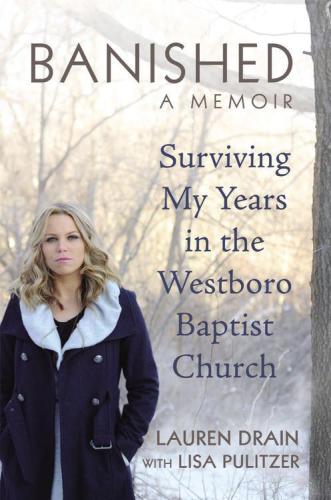
Banished
Surviving My Years in the Westboro Baptist Church
کتاب های مرتبط
- اطلاعات
- نقد و بررسی
- دیدگاه کاربران
نقد و بررسی

December 24, 2012
A move with her family to Topeka, Kans., in 2001 precipitated years of immersion in a virulently antigay, hate-fueled church, which Drain, now in her late 20s, depicts in this somewhat incongruously matter-of-fact, emotionally one-note memoir. The Drain family moved from Florida at the instigation of her father, a documentary filmmaker whose critical work about the notorious gay rights–picketing Westboro Baptist Church evolved into a highly admiring portrait of this small Calvinistic sect that believed in the imminent end of the world, the frightening wrath of God before the innate sin of mankind, with a slim few chosen for “election.” A small, insular sect started in 1955 by the loud curbside preacher Fred Phelps, the WBC was mostly run by his dozen children and grandchildren, who all lived in a compound around the Topeka church, maintained tight control over communal behavior, and regularly picketed events such as gay pride and AIDS marches with incendiary language and signs designed to provoke outrage (e.g., “God hates fags”). Obedience and conformity were pillars of the church, and increasingly hard to swallow for the then-teenage author whose few forays into adolescent flirting got her branded a “whore.” Her narrative of these horrifying pickets are detailed (“we became almost possessed”) and particularly chilling in her recitation of being absolutely cast out by her own family without any compunction. Agent, Lisa Grubka, Fletcher & Co.

January 15, 2013
The inside story of a small hate group that captured big headlines. The Westboro Baptist Church is infamous for having carried picket signs reading "Thank God for 9/11" on the day it happened. They brought the message "God Hates America" to the funerals of servicemen killed in action and picketed George W. Bush's second inauguration with signs that read, "God Hates Fag Enablers." Considering themselves the messengers of a wrathful, vengeful God, they warn of an upcoming apocalypse in which all but the elect members of their church will be plummeted to hell. With the assistance of former New York Times correspondent Pulitzer (co-author: Stolen Innocence: My Story of Growing Up in a Polygamous Sect, Becoming a Teenage Bride, and Breaking Free of Warren Jeffs, 2010, etc.), Drain describes the life of this pernicious cult and the seven years that she spent in its clutches. Located in Topeka, Kan., the Church's congregation brought together 70 people at most, many of them family members of pastor Fred Phelps, whose belief system was based on a fundamentalism that targeted homosexuals. The author's father converted while filming a documentary about the group. In 2000, he coerced his wife and the author (then 15) to join and accompany him in a move from their Florida home to Topeka. She describes how she struggled to adhere to the group's doctrine, a struggle caused by extreme social pressure (including her father's physical abuse and threats to disown her.)Even so, she was ultimately banished from the group (and any contact with her immediate family) in 2007. Drain describes how her own identity eroded during the time she was a member of the cult, as she sought to quell her doubts in order to gain acceptance, and how the dynamic of an extended family intensified their paranoid delusions. A chilling but illuminating account of the inner workings of a hate group and Drain's ultimately successful struggle to free herself.
COPYRIGHT(2013) Kirkus Reviews, ALL RIGHTS RESERVED.

March 1, 2013
What is it like to grow up in a cultish hate group? Drain painstakingly tells her story in this memoir, the first of its kind from among the Westboro Baptist Church (Topeka, KS) followers. These days, any mention of the Westboro group and its fiery founder, Fred Phelps, quickly stirs up anger among Americans. From Westboro's hate speech to its members' controversial protesting of military funerals, it has become a fixture in the news and not in a good way. Coauthored by Pulitzer (coauthor, Mob Daughter), this memoir is a simply written, emotionally honest telling of Drain's story, which shares details about growing up in the midst of pickets and hate speeches. Beginning with her father's involvement with the church and her family's move from Florida to Kansas, she offers heartbreaking details of how the twisted teachings of the church ruled her life and affected her relationships with members of her family--and how those relationships have changed now that she no longer espouses Westboro's views. The chapter on her banishment from the church, and her family cutting her off, is particularly searing. VERDICT This memoir will be widely popular as an inside look into one of the most despised groups in America. It is sure to interest many.--Holly Hebert, Brentwood P.L., TN
Copyright 2013 Library Journal, LLC Used with permission.

























دیدگاه کاربران